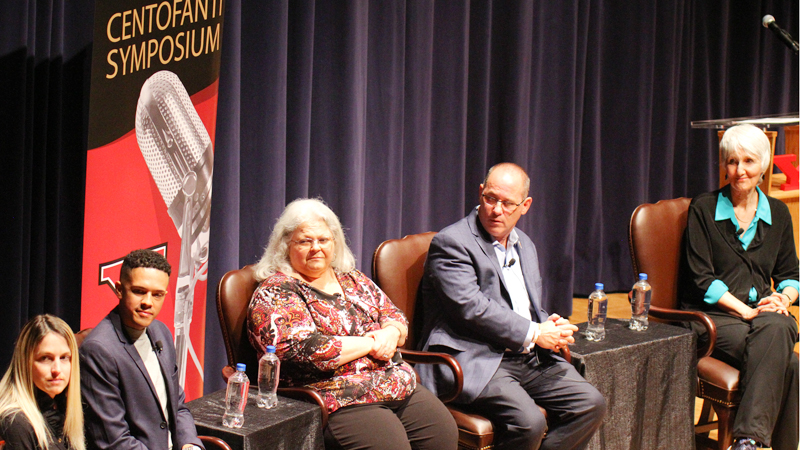Survivors of mass tragedies speak at Stambaugh Auditorium

By WILLIAM K. ALCORN
alcorn@vindy.com
YOUNGSTOWN
A panel discussion, “Survival and Moving Forward,” featuring individuals closely associated with some of the nation’s most tragic mass school shootings, including Sandy Hook, Marjory Stoneman Douglas and Columbine High School, described how they each are dealing with their grief.
The panel also included a survivor of the June 12, 2016, massacre at Pulse, a gay nightclub in Orlando, Fla.; the mother of Heather Heyer, a young woman run over and killed by a white supremacist in Charlottesville, Va.; and Sue Klebold, mother of Dylan Klebold, one of the two teens responsible for the Columbine High School killings in 1999.
Klebold admitted being worried and concerned about joining her fellow panelists, none of whom had met before Thursday.
“When we met and sat down and talked, it was a good experience, Klebold said.
Other panel members were Fred Guttenberg, father of Jaime Guttenberg, who was killed Feb. 14, 2018, when a gunman entered Marjory Stoneman Douglas High School in Parkland, Fla.; Kaitlin Roig, former teacher at Sandy Hook Elementary School in Newtown, Conn., site of a mass shooting Dec. 14, 2012; Brandon Wolf, survivor of the Pulse gay nightclub massacre June 12, 2016; and Susan Bro, whose daughter, Heather Heyer, was killed by a white supremacist from Ohio in Charlottesville, Va., on May 13, 2017.
Their responses, elicited by the panel moderator, were emotional and often raw.
“We found we had something in common. We understand each other’s grief. It kind of makes you feel more normal,” Bro said.
“Part of the fear is that you will forget your friends who died. But the outpouring of love from the community gave me strength. We never say enough that we love each other,” Wolf said.
“I don’t think I told my daughter ‘I love you’ that day. That haunts me,” Guttenberg said. “The grief doesn’t go away.”
He said he is planning to leave his community because there are too many reminders of his daughter. “The grocery store is near to the dance studio where she took lessons,” he said.
“I felt broken when my daughter was killed. My community is the only reason I don’t feel that way anymore. They knew when we needed more and when we needed less,” Guttenberg said.
Roig, a former teacher at Sandy Hook, hid with her students, and they survived. But they listened to their classmates and fellow teachers being shot and dying.
“Those memories don’t go anywhere. You learn to live with and live through it,” she said.
The residual effects of trauma can be underestimated, said Klebold, whose son killed himself after the Columbine shootings.
Not only did she lose a son, she said the community was very cruel and that she has suffered with post-traumatic stress syndrome twice since the event.
Wolf said he encountered survivors’ guilt because he brought his friends to the nightclub that night.
Bro urged people to be good and kind to each other – and love each other a little more.
The event was sponsored by the James and Coralie Centofanti Foundation, which in 2012 established the Centofanti Center of Health and Welfare for Vulnerable Populations at the Bitonte College of Health and Human Services at Youngstown State University.
 43
43
